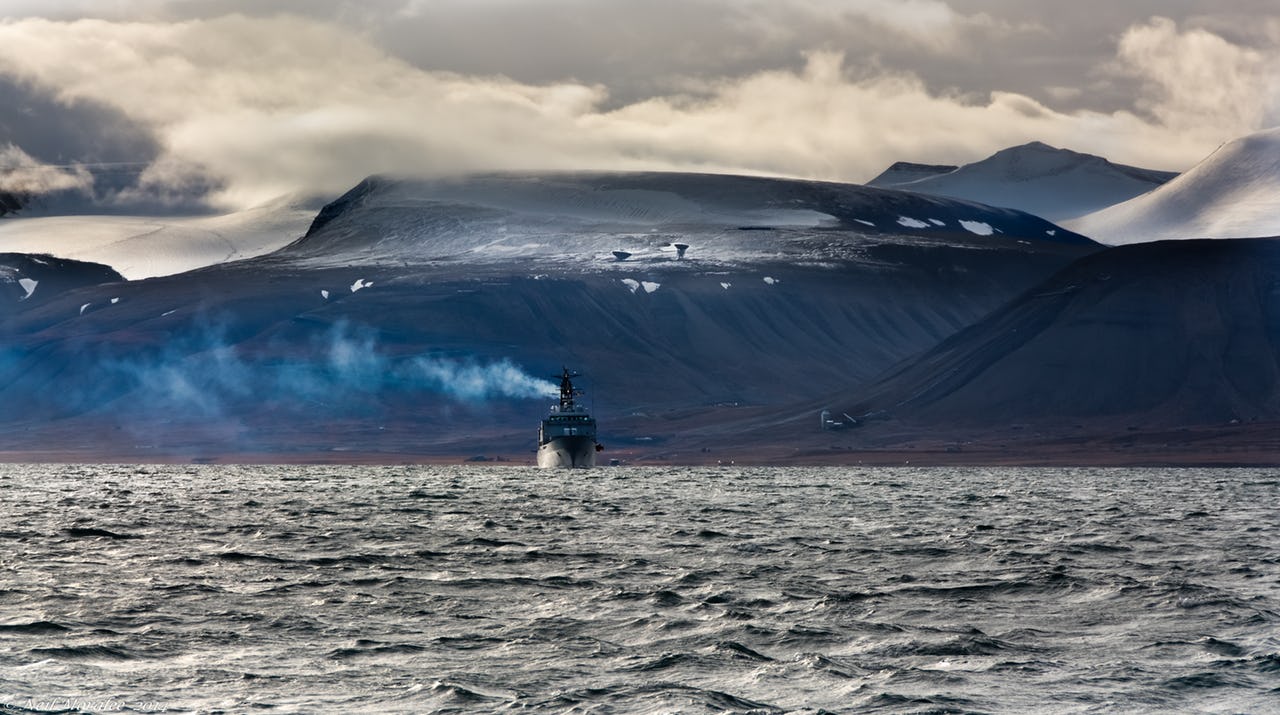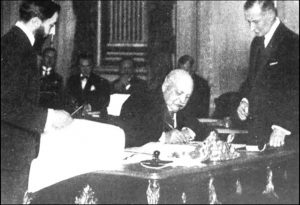The Norwegian Svalbard Policy - Respected or Contested?

Listening post and Norwegian coast guard in Svalbard, Norway. Photo: Neil Moralee
Over the last weeks, the Svalbard Archipelago has appeared in several headlines in Norwegian media. We have read about possible conflicts with Russia over Norway’s Svalbard policy, debates with the EU on snow crab fishing, and Russian military exercises around the archipelago. This October, the Russian newspaper Kommersant claimed that a national security report by the Russian defense ministry says that the Norwegian Svalbard policy is a source of conflict that could lead to war. A Norwegian White Paper on Svalbard from 1999 says that Norway’s handling of the Svalbard Treaty obligations are recognized and respected by the international community. This sentence has, however, been removed from more recent white papers on Svalbard. In fact, these recent events tell us that the Norwegian Svalbard policy is contested – not just by Russia.
The principle of non-discrimination
It is important to note that Norway’s sovereignty on Svalbard is not contested. The 1920 Svalbard Treaty, which has been signed by a total of 44 countries (among others, Russia, the UK and several EU countries), establishes Norway’s full sovereignty over Svalbard. The treaty also provides the citizens of the signatory countries equal rights to live, work, and engage in business and commercial activities on Svalbard. This is referred to as the principle of non-discrimination. The problem is that the Svalbard Treaty is vague, especially when it comes to the ocean around the archipelago. Through the 1982 United Nations Convention on the Law of the Sea (UNCLOS), a coastal state has the right to establish an exclusive economic zone of 200 nautical miles from its coastal base lines, in which it has exclusive rights to the resources of the ocean as well as on and under the seabed. The Svalbard Treaty was signed before UNCLOS was established, and thus does not say anything about the area outside the territorial waters of 12 nautical miles.

Russia is critical of several parts of Norway’s Svalbard policy but the biggest disagreement is over the area outside territorial waters. While the Norwegian government maintains that it has exclusive rights over the ocean around the archipelago, Russian officials argue that the principle of non-discrimination from the Treaty also applies here, and that Svalbard has its own continental shelf. The Norwegian government interprets the Svalbard Treaty literally and thus argues that because the area outside the territorial waters is not mentioned, the Treaty does not apply there.
Fisheries protection zone – respected and contested
Despite the Norwegian government’s claim that it has the full right to a full exclusive economic zone around Svalbard, it has not established one thus far. Instead, in 1977, Norway established a so-called temporary fisheries protection zone (FPZ) of 200 nautical miles around Svalbard in order to protect the living marine resources in the ocean and to regulate fishing sustainably. Norway’s rights in the FPZ are limited compared to a full exclusive economic zone. Norway does not have exclusive fishing rights in this zone but administers the distribution of fishing quotas to other countries. The distribution of quotas is based on the traditional fishing in the area, which means that countries such as Russia and Iceland receive a fair share of the licenses. Russia has for the most part respected the regulations of the FPZ but officially holds that Norway is violating the Svalbard Treaty with the FPZ. Nevertheless, the Norwegian Coast Guard has on several occasions arrested Russian fishing vessels for violations of the regulations, such as illegal dumping of fish or using illegal fishing equipment, which in turn has led to protests from Russian officials.
Other countries have protested the FPZ as well. The EU, Iceland, the UK and Spain all hold that the Svalbard Treaty applies outside territorial waters and on the continental shelf. In 2016 the EU notified Norway that the European Commission had distributed licenses to fish snow crab around Svalbard. This lead to protests from Norway, and the Norwegian minister of fisheries said that “we will not give up one single crab”. The Norwegian Coast Guard then arrested a Lithuanian trawler with an EU license. Following these events, Baltic fishermen have tried to bring the case to the European Free Trade Association’s (EFTA) surveillance authority, but were rejected. Latvia has threatened to take the case to the international court in The Hague.
Does Svalbard have its own continental shelf?
Not only fishing in the area around Svalbard has been contested. In 2015 Norway opened new blocks for oil and gas in the northern part of the Barents Sea, which was met with protests from Russia. Russia claims that some of these blocks are on the continental shelf of Svalbard, and that Norway therefore violates the Svalbard Treaty by opening these blocks without any consultations with the contracting parties. Norway, on the other hand, argues that this area is part of the Norwegian continental shelf, and that Norway therefore does not have to consult with Russia or anyone else when it comes to the oil and gas activity.
Russian officials have on several occasions requested talks with Norway over Svalbard, but the Russian foreign ministry has said that it is not getting any response from the Norwegian side. The Russian foreign minister Sergey Lavrov expressed strong dissatisfaction over the lack of dialogue on Svalbard at a recent meeting of the Barents Euro-Arctic Council. Then foreign minister of Norway, Børge Brende, answered that “Norway is complying with every comma of the Svalbard Treaty”.
Considering the fact that the Norwegian interpretation of the Svalbard Treaty is contested, it is quite astonishing that the Norwegian government continues to play hardball on the issue. Consequently, it is not surprising that the Russian defense ministry identifies this policy as a source of conflict. By stating this, Russian officials send strong signals that they disagree with Norway’s Svalbard policy. Arctic cooperation is strong and fruitful in many areas. The Norwegian government has consistently claimed that stability and predictability is a goal of the Norwegian Svalbard policy. To avoid that the relationship with Russia deteriorates and that tensions rise, Norway should consider discussing the more complicated issues about Svalbard.
The original version of this article was published with High North News on 10 November 2017.